Diamonds are undeniably the most popular and highly coveted gemstones in the world of jewelry. They are frequently used to create exquisite engagement rings, showcasing their remarkable beauty. In addition to their stunning appearance, diamonds possess the remarkable attribute of being the hardest material on Earth.
However, one might wonder: Can a real diamond be scratched?
Although diamonds are incredibly durable and resistant to damage, there are certain circumstances in which they can indeed be scratched. What could possibly cause harm to the hardest substance known to us, you may ask?
In this article, we will explore the answer to this question, along with many others. So, without further delay, let us delve into the fascinating world of diamonds.
DESIGN YOUR OWN ENGAGEMENT RING: START WITH A SETTING OR START WITH A DIAMOND. IT’S REALLY UP TO YOU!
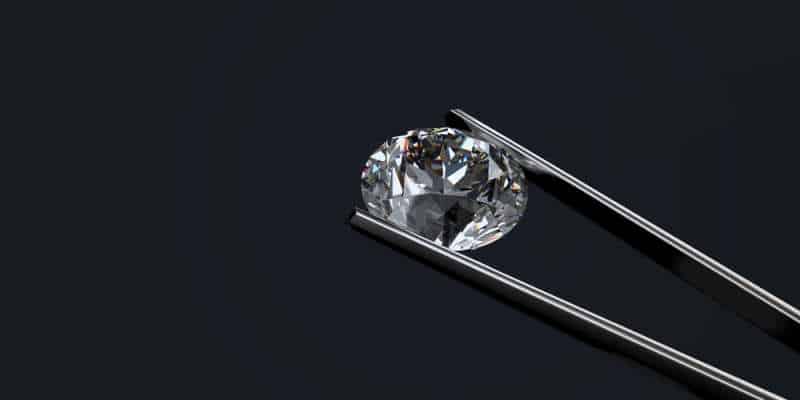
Let’s Talk About Diamonds
Diamonds represent a crystalline form of pure carbon, with atoms arranged in a unique structure. Carbon exists in different forms based on the type of chemical bonding, with the two most common forms being diamond and graphite.
Diamonds possess exceptional properties that make them highly valuable and versatile. They are renowned for their hardness, being the least compressible substance and exhibiting excellent thermal conductivity and high sound velocity.
In this article, our focus will be on the hardness of diamonds and its connection to scratching.
The Hardness of Diamonds: Key Facts to Consider
The term “diamond” originates from the ancient Greek word “invincible,” which aptly describes its hardness.
Diamonds are celebrated for being one of the hardest substances on Earth, and here’s why:
The minerals involved in the creation of diamonds make them exceptionally strong gemstones. Diamonds are formed from carbon subjected to extreme heat and pressure deep within the Earth’s mantle, typically at depths ranging from 87 to 120 miles. The process of diamond formation can take up to 1.3 billion years.
The immense pressure and heat cause the carbon molecules to rearrange themselves, resulting in a tightly packed structure. This phenomenon, known as covalent bonding, renders the molecules immobile and accounts for the hardness of diamonds.
You may have come across the fact that diamonds are assigned a rating of 10 on the Mohs scale of mineral hardness.
If not, it’s worth knowing that the Mohs scale was devised by German mineralogist and geologist Friedrich Mohs in 1812. This scale categorizes the scratch resistance of minerals by assessing the ability of a harder mineral to scratch a softer one.
To provide some context, let’s examine diamonds in relation to the Mohs scale:
Mohs Scale (Hardness)
Mineral
1
Talc
2
Gypsum
3
Calcite
4
Fluorite
5
Apatite
6
Orthoclase feldspar
7
Quartz
8
Topaz
9
Corundum
10
Diamond
Related Read:
White Topaz Vs. Diamond: Critical Differences
It’s important to note that the numbers on the Mohs scale are not evenly spaced, which can sometimes be misleading.
For instance, a mineral with a rating of 5 is not necessarily half as hard as a diamond. In fact, the overall difference between minerals ranging from 1 to 9 is less significant than the disparity between 9 and 10 alone.
Furthermore, it’s crucial to consider that hardness is not the sole factor to consider when evaluating a material. While hardness relates to scratch resistance, other factors like a substance’s ability to absorb impact and resist breaking or chipping, known as toughness, also come into play.
Gems with low toughness may be susceptible to chipping, cracking, or breaking if subjected to significant force, such as being struck with a hammer or dropped on a hard surface.
Due to their perfect score of 10 on the Mohs scale, you might assume that diamonds are impervious to scratching, let alone breaking. However, this statement is only partially true.
Let’s examine what substances can and cannot scratch one of the Earth’s hardest materials.
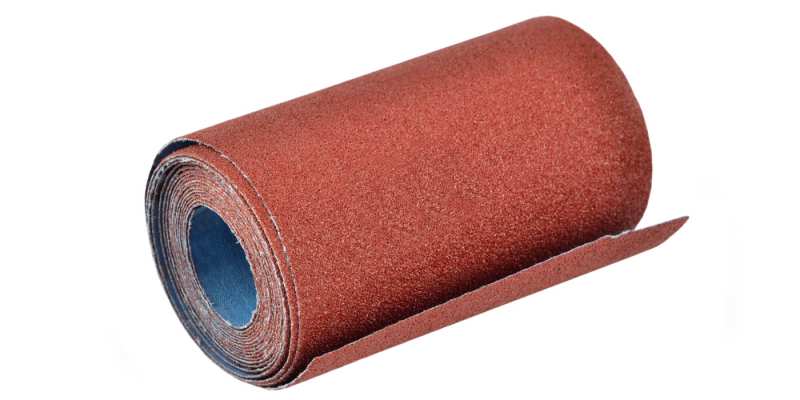
Can Sandpaper Scratch A Diamond?
The answer is quite straightforward: sandpaper cannot scratch a diamond.
This is because sandpaper has a hardness level ranging between 7 and 9 on the Mohs scale, making it softer than a diamond.
It’s common for people to use sandpaper to test the authenticity of a diamond, as it is a simple and accessible method. However, caution must be exercised during this test, as using sandpaper can potentially damage gold and silver jewelry.
Additionally, it’s worth noting that some sandpaper grits are made of synthetic sapphire, which can scratch other gemstones, including rubies and emeralds. If you suspect your jewelry may be fake, it’s advisable to have it tested and evaluated by a professional to preserve its integrity.
Can you scratch a diamond with metal?
Most metals have a hardness level of five or lower on the Mohs scale, which means it is not possible to scratch a diamond with them. However, a diamond can scratch metal, including silver and gold. Metals typically have an ionic structure, which makes them prone to absorbing force. Therefore, we can conclude that diamonds can scratch metal, but not the other way around. While some metals may be harder, they are still not hard enough to scratch a diamond. For example, steel falls between 4 and 4.5, titanium is 6, hardened steel is between 7 and 8, and tungsten is 7.5. Even tungsten carbide, with a hardness of 8.5 to 9 on the Mohs scale, is not sufficient to scratch a diamond.
Can diamonds be scratched by concrete?
In certain situations, diamonds are used as cutting tools for concrete. However, the diamond bond must be precisely matched to the hardness of the concrete. If the diamond bond is softer than the concrete, the diamonds will wear off quickly. Conversely, if the diamond bond is harder than the concrete, the diamonds will resist cutting into the concrete, resulting in uneven scratch patterns on the diamonds.
Can lab-grown diamonds be scratched?
Lab-grown diamonds are created by simulating the conditions under which natural diamonds form. They are physically, chemically, and optically identical to mined diamonds. As such, they are cut with the same precision and are just as resistant to scratching as natural diamonds.
Can black diamonds get scratched?
Natural black diamonds are extremely rare and challenging to cut due to inclusions within them. These inclusions make them even harder than colorless diamonds, making them nearly scratch-proof. However, black diamonds can still be scratched by another diamond.
Can a diamond scratch another diamond?
Yes, a diamond can scratch another diamond. This applies to both natural and lab-grown diamonds, as they possess the same level of hardness.
Can natural diamonds scratch other materials?
As the hardest material on Earth, diamonds can scratch nearly anything. However, in everyday situations, this is usually not a concern since diamonds are not typically used to scratch objects. However, certain designs may unintentionally allow a diamond ring to scratch other surfaces.
A word on the setting of the diamond in the ring:
It is recommended to consider the setting of your diamond ring to minimize the risk of damage. A raised setting may expose the diamond to more potential damage. However, this does not mean you should avoid such settings altogether, as they can enhance the prominence of the stone. While it is highly unlikely to scratch your diamond ring, it’s still important to take precautions to prevent damage. Even the hardest material has its limits. The good news is that if damage does occur, there are various ways to repair it.
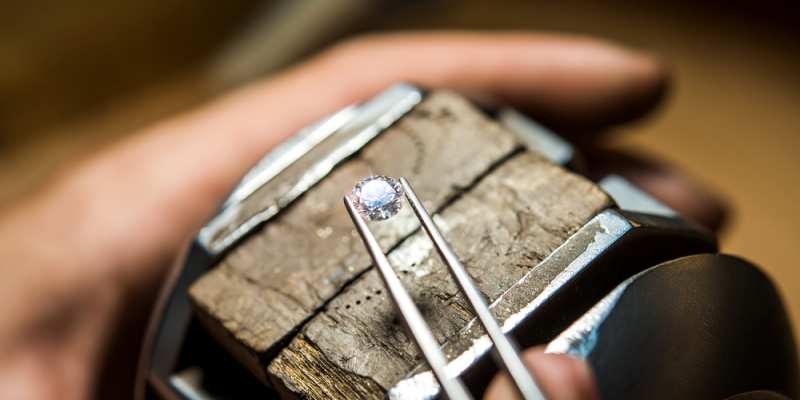
Can You Repair A Scratched Diamond?
Repairing a scratched diamond is possible, but it depends on the carat weight and the extent of the damage. The repair method is determined by the amount of damage incurred.
Minor repairs can be made by having the diamond professionally repolished. However, it’s important to note that repolishing won’t replace any missing parts or chips in the diamond. During the repolishing process, the carat weight of the stone will be slightly reduced to restore a smooth surface. Although there may be a minimal loss of carats, generally around 0.02 to 0.1 carats, the overall value of the diamond is not significantly affected.
On the other hand, larger repairs may require recutting the diamond if the scratch is deep, extensive, or has resulted in chipping. Recutting should be approached with caution as it involves removing more of the diamond than repolishing. This can significantly impact the value of the diamond, and the diamond cutter may need to redesign the stone. It’s important to consider the risk of shattering during the process, as diamonds have cleavage planes that make them susceptible to splitting if not handled properly. However, in some cases, recutting can improve the diamond’s appearance, particularly by enhancing its clarity. If the trade-off involves sacrificing a small number of carats for a higher clarity rating, it may be worthwhile.
Overall, repairing a scratched diamond is a delicate process that requires professional expertise and careful consideration of the diamond’s characteristics and value.
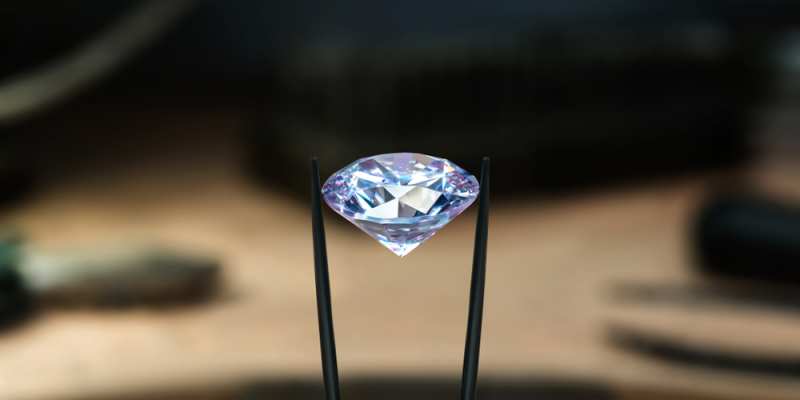
Tips On Keeping Your Diamond From Getting Scratched
To ensure the protection and longevity of your diamond jewelry, we recommend following these guidelines:
- Remove your diamond jewelry before engaging in physically intensive tasks such as household chores, gardening, or playing sports. This will minimize the risk of damaging your precious stones.
- Avoid storing diamonds with other gemstones, particularly other diamonds. To prevent scratches, it’s important to keep them from colliding with one another. Proper storage and individual compartments for each piece of jewelry can help maintain their integrity.
- Schedule regular appointments with your jeweler, preferably at least once a year, to have your diamond jewelry inspected. Professionals can assess the condition of your diamonds and ensure they are in good shape, addressing any potential issues early on.
Cleaning your diamond jewelry is also an important aspect of maintenance. Here are some tips:
- Use a soft-bristled toothbrush to gently clean your diamond jewelry. The bristles will help remove dirt and restore the diamond’s shine. Be cautious not to scrub too vigorously, as this can cause damage.
- Avoid using toothpaste to clean your diamond jewelry. Despite being a popular online suggestion, toothpaste can actually be harmful to your valuable pieces and should be avoided.
Regarding the authenticity of a scratched diamond, it’s uncommon for genuine diamonds to be easily scratched in everyday situations. If you find that your diamond has been scratched without any contact with another diamond, there is a possibility that it may not be a genuine diamond. Remember, only a diamond can scratch another diamond. If you suspect that your stone may be an imitation, it’s advisable to consult a jeweler who can provide accurate information about its authenticity. They have the expertise to assess your diamond and determine its true nature.
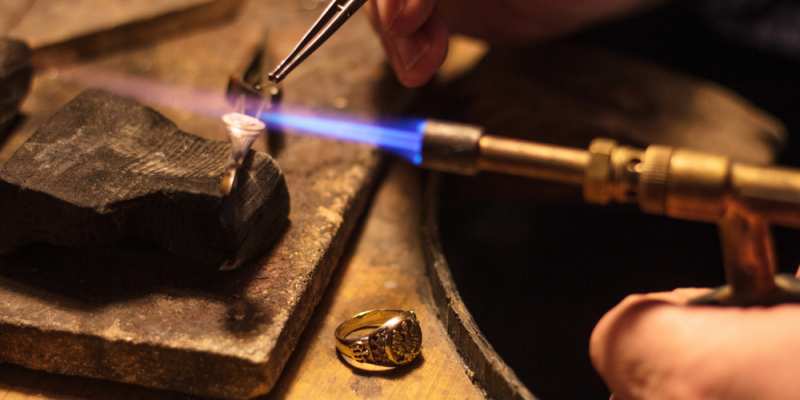
Conclusion
To provide a concise answer to the question of whether a real diamond can be scratched, here’s a summary:
- Natural diamonds can be scratched, but only by other diamonds. Their exceptional hardness makes them resistant to damage from most other materials.
- Metals, other gemstones, and sandpaper are not capable of scratching a real diamond because they are not as hard as diamonds.
- If your diamond does get scratched, there are two options for repair: repolishing and recutting. The choice depends on the severity of the scratch.
- If you have a scratched diamond or any doubts about its authenticity, it is recommended to consult a professional jeweler. They can assess your stone and determine if it is indeed a genuine diamond.
By following these guidelines and seeking professional assistance when needed, you can ensure the proper care and maintenance of your diamond jewelry.


